Life-changing moments
By Bryan Hay
It was a life-changing moment in 2019 for Quincy Miller ’97 and his family, traveling along the Ghana coast and seeing the whitewashed castles that for centuries served as hubs of the transatlantic slave trade.
“To be able to stand in a place where your ancestors were ripped from this country and be inside the door of no return 400 years later was an experience that my family and I will never forget,” Miller says.
He and his family experienced no ordinary trip to west Africa. It was led by a friend and mentor to them and countless other Lafayette students through the years, Rex Ahene, professor emeritus of economics. For more than 25 years, he has taken students to several African countries to help them learn directly and more deeply about the continent’s culture and contributions.
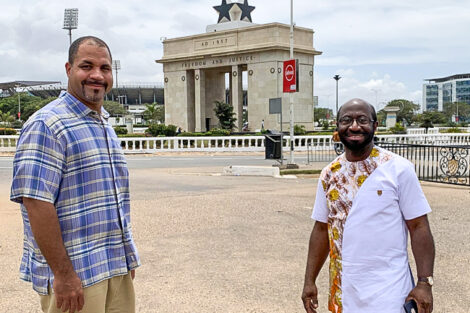
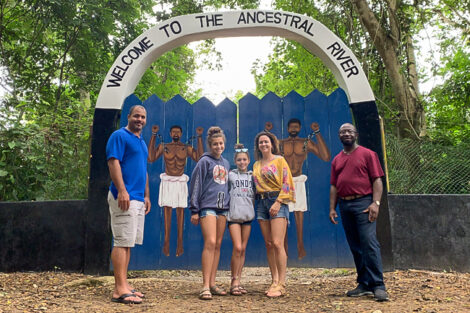
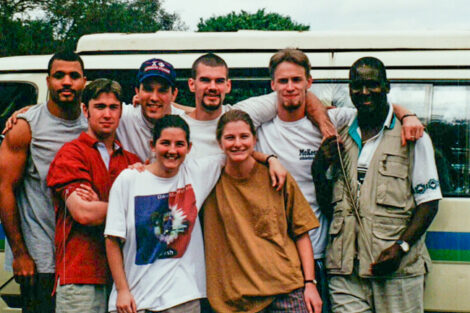
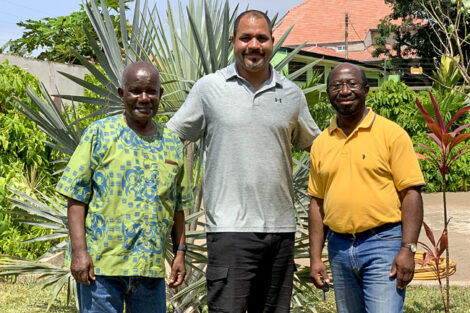
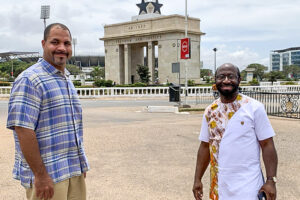
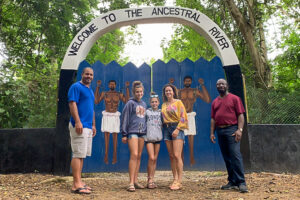
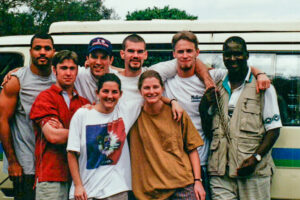
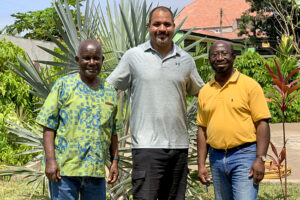
By leading these trips, Ahene set out to help erase stereotypes. Inspired by Roots, the novel by Alex Haley, and the lack of diversity on campus, he organized his first trips in the early 1990s.
“As the only Black professor on campus, I worked very hard to try to diversify the student body and the faculty by broadening the number of Black faculty on campus,” he says. “I also realized there was very little support for students of color on campus because the curriculum was very Eurocentric, a very conservative, and previously very white, institutional life of the College up until that point.
“And the ignorance about Africa in general across the student body was tremendous at the time,” recalls Ahene, who retired in 2022 after a distinguished 40-year career at Lafayette.
He remembers the all-too-common perceptions about Africa just a quarter century ago: that it lacked a modern civilization of its own and that its people lived in squalor.
“When you started talking to students, you saw that their knowledge of Africa was narrow and distorted. I felt there was a need to do something about that,” he says. “So, taking students to Africa to have them experience the continent’s diversity firsthand would dispel many stereotypes and give them a more realistic view and an opportunity to learn from personal experience rather than through what other people are saying.”
Immediately, the stereotypes dissolved. Students witnessed that facilities, amenities, and infrastructure resembled those of the U.S. “You don’t see starvation, you don’t see homeless people,” he says. “You see family structures and social structures that are very strong. People are very kind. And that was a sharp contrast to the perception that most of the students had back then.”
The early trips to Liberia and Sierra Leone, Ghana, Togo and Benin, Kenya and Tanzania, to list a few, provided valuable learning experiences not only for students but also for Ahene, who wanted to ensure a safe and seamless experience for students.
Planning and managing a structured program meant hard work and preparation, but it “took away the fear and uncertainty students had traveling to Africa, allowing them to learn, rather than attempting to undertake the experience on their own with all the ups and downs,” he notes.
“My two motivations behind organizing the trips were first to expose our students to Africa to learn realistically about the continent and what it represents, and not the stereotypes,” Ahene says. “And second, to organize the trip in such a way that the learning opportunities were a priority and not the concerns about health and safety and the insecurities associated with a continent unknown to our students.”
Miller was among the first students to accompany Ahene to Africa. He experienced Kenya and Tanzania with him for two weeks in January 1997 and learned about balancing land conservation, natural habitat preservation, and economic development aspirations in developing countries. With expertise in real estate and land policy, Ahene has served as a policy adviser to many national governments, multilateral development institutions, academic institutions, and think tanks on how restructuring property and economic rights can enable markets and free enterprise to redress the ill effects of colonialism and underdevelopment, especially in post-colonial countries throughout Africa.
…having the opportunity to be with Rex and on that trip was a tremendous experience at such a young age.
“Being in the motherland for the first time was quite inspiring for me,” says Miller, president and vice chair of Eastern Bank in Boston and a member of Lafayette’s Board of Trustees. “Being a Black man and having the opportunity to be with Rex and on that trip was a tremendous experience at such a young age. The generosity of a Black alumnus who donated money for me to go on the trip made it more special because I didn’t have the financial means. I was able to be immersed in nature and the history of these countries led by a man who cared so deeply about teaching and enlightening us.”
Bringing students to Africa led to a deeper intellectual exploration on campus through the Africana Studies program, Ahene shares.
“I think the motivation for the Africana Studies program came from my students, who after these trips wanted more courses about Africa’s history, politics, economy, and everything,” Ahene says. “And, you know, the realization that the curriculum was not diversified enough with courses of that nature was one of the most direct impacts of the exposure that students received. Once exposed to the stereotypes and the negativity of it, students wanted to learn more.”
Miller remembers the tenderness and intimacy of a Rex Ahene-led trip to Africa.
“We traveled with him to Bonwire, in Ghana, the original village where kente cloth came from, and got to try out how to weave the colorful material. Rex even invited us to the wedding of his niece,” he says. “We were there with him as his guests, experiencing a Ghanaian wedding in his home country. By the end of the trip, my kids were calling him Uncle Rex.”